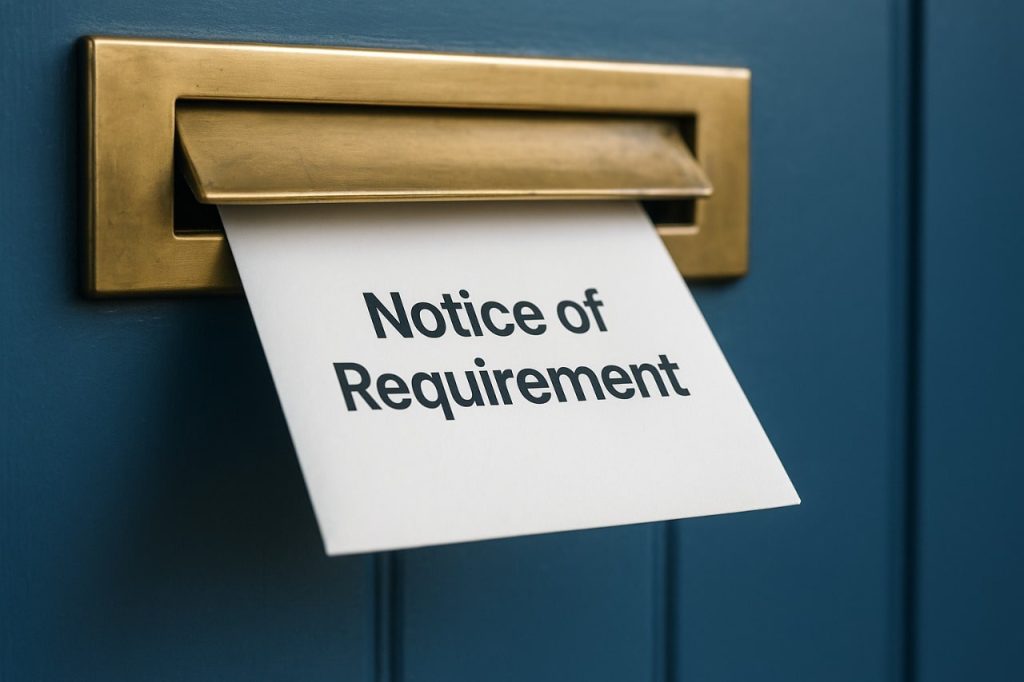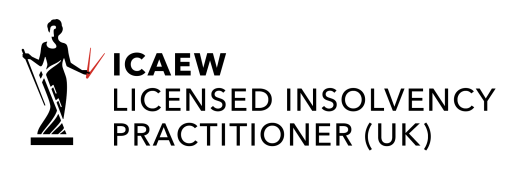VAT Notice of Requirement Security Deposits: Understanding Their Purpose and How to Respond
A notice for a VAT security deposit can arrive without much warning and place an immediate strain on working capital. HMRC issues security where it believes there is a risk of future non-payment, particularly where there is a history of arrears or phoenix activity.
We explain the trigger points for a Notice of Requirement, how security is calculated, and what happens if you trade without paying it. You will see practical options that include negotiation, challenge, staged funding and, if required, a move to formal insolvency that resets risk and allows an orderly outcome.

Understanding VAT “Notice of Requirement” Security Deposits
A VAT Notice of Requirement (NOR) is a formal demand from HMRC that requires you to provide a financial security deposit. It is used when HMRC believes there is a genuine risk of unpaid VAT in the future, often due to past compliance issues or concerns about ongoing trading behaviour.
Definition and Purpose
A Notice of Requirement is a legally binding notice issued by HMRC requiring you to lodge a security deposit. This deposit is usually held as a cash payment, bond, or guarantee. The amount is determined by HMRC and is intended to cover potential VAT liabilities that may arise.
The purpose is not to penalise you for past debts but to protect future tax revenue. HMRC uses the security as a financial safeguard in case your business fails to pay VAT on time. Without paying the deposit, you cannot legally continue to make taxable supplies.
You should treat the NOR as a compliance measure rather than a fine. It signals that HMRC considers your business to present a risk of default and therefore requires upfront protection.
Legal Basis and HMRC Authority
HMRC has statutory authority to issue a Notice of Requirement under VAT law. The legal framework allows HMRC to demand security where they consider it necessary to protect future revenue. This authority extends to VAT, PAYE, and National Insurance contributions.
Failure to comply with a NOR has serious consequences. Continuing to trade without providing the required security is a criminal offence and may lead to prosecution. In addition, HMRC can impose financial penalties and restrict your ability to trade.
The notice itself will state the amount of security required, the deadline for payment, and the acceptable forms of security. HMRC usually accepts either a cash deposit or a bank guarantee, depending on your circumstances.
Common Triggering Events
HMRC typically issues a Notice of Requirement when there is evidence of unpaid VAT or a history of late payments. If your business has previously failed to meet VAT obligations, you are more likely to be considered a risk.
Other triggers include links with businesses that have outstanding tax debts, evidence of “phoenix” trading, or concerns about insolvency. HMRC may also issue a NOR if they believe your current financial position makes future non-payment likely.
Common risk factors include:
- Repeated late VAT returns or payments
- Previous company failures leaving tax debts
- Trading in sectors with high VAT fraud risk
- Poor financial standing or insolvency proceedings
If you receive a NOR, it means HMRC has identified one or more of these risk indicators and requires assurance before allowing you to continue trading.
Who Can Receive a VAT Notice of Requirement
You may receive a Notice of Requirement if HMRC believes there is a risk that future VAT liabilities will not be paid. These notices can apply to different types of businesses as well as to individuals who hold responsibility for managing them.

Business Structures Affected
A Notice of Requirement can apply to a wide range of business types. Sole traders, partnerships, and limited companies are all within scope if HMRC considers there is a compliance risk.
In many cases, the notice is directed at companies that have built up VAT arrears or have a history of late payments. However, it is not limited to businesses with existing debts. HMRC can act pre-emptively if they believe there is a significant chance of non-payment in the future.
The security deposit is usually based on estimated future VAT liabilities. For new businesses, HMRC may use projected turnover figures or past trading levels from related ventures. This means even recently established businesses can be required to provide security before trading continues.
Director and Officer Liability
If you are a company director or officer, you may be personally named on a Notice of Requirement. HMRC can hold individuals accountable where they believe the company structure is being used to avoid VAT obligations.
Personal liability is particularly common when a business has been closed with debts and a new entity has been set up to continue trading. This practice, sometimes referred to as “phoenixing”, is a key trigger for HMRC action.
When directors are named, they must provide the required security in their own capacity, not just on behalf of the company. Failure to do so can result in fines and restrictions on trading. This makes it essential for directors to understand both the financial and legal implications of receiving such a notice.


Situations Leading to Issuance
HMRC typically issues a Notice of Requirement when there is evidence of repeated non-compliance. This includes late VAT returns, unpaid liabilities, or a history of default under previous business ventures.
You may also face a notice if HMRC believes your business is at high risk of default due to financial instability. Indicators include poor payment history, insolvency proceedings, or links to previously failed businesses.
In some cases, the notice is issued without prior warning. HMRC has the authority to act quickly if they consider the revenue at risk. If you receive one, you must comply by the stated deadline to avoid penalties and trading restrictions.
How Security Deposit Amounts Are Calculated
The amount of security you are asked to provide is not random. HMRC bases it on your expected VAT liability, your compliance history, and any unpaid tax debts that remain outstanding.
Calculation Methods
HMRC usually calculates the required security by estimating your VAT liability over a set period. This is typically six months if you file quarterly returns or four months if you file monthly returns.
The calculation often includes:
- Your average VAT liability per return period
- Multiplying that figure by the number of periods (six or four months)
- Adding any arrears from current or previous businesses you are linked to
The security is usually requested as a cash deposit or a bank guarantee. HMRC sets out the exact amount and payment method in the formal Notice of Requirement.
Factors Influencing the Deposit
The main factor is the perceived risk of non-payment. If HMRC believes there is a high chance you may default on VAT, the deposit will be higher.
Key influences include:
- Compliance history: late filings or missed payments increase the risk
- Outstanding debts: existing VAT or PAYE arrears raise the required security
- Business type: sectors with higher default rates may face stricter requirements
- Links to past businesses: if you were involved in a failed business with tax debts, this can affect the calculation
You should expect HMRC to look at both your current trading position and your financial track record.
Typical Security Amounts
The amount varies, but it usually reflects several months of VAT liability. For many businesses, this can mean thousands of pounds.
For example:
| Filing frequency | Period used for calculation | Typical coverage |
|---|---|---|
| Quarterly | 6 months | 2 return periods |
| Monthly | 4 months | 4 return periods |
If your average VAT bill is £5,000 per quarter, HMRC may require around £10,000 plus any arrears.
The deposit remains in place until HMRC is satisfied that you have established a reliable compliance record.
Closing a Limited Company with Debts?
Fast and Stress-Free Solutions.
Start closing your limited company today. Placed into liquidation within 8 days. We fully understand that timing is critical.
Worried about your Bounce Back Loan?
Need to close your limited company? Speak to an expert who’s helped thousands do the same – even with company debts or creditor pressure.
Stop Creditor Pressure
Getting constant calls from creditors? Closing your company through liquidation can give you the relief to move forward.
Directors: Avoid Risks When Winding Up Your Company
We guide you, simply, honestly. Let us handle everything.
Process for Receiving a VAT Notice of Requirement
When HMRC issues a Notice of Requirement, it sets out the amount of security demanded, how it must be paid, and the timeframe allowed. Your actions at this stage directly affect whether you can continue trading without disruption.
How Notices Are Issued
HMRC issues a Notice of Requirement (NOR) when it considers there is a risk you may not pay future VAT liabilities. This risk is often based on factors such as previous arrears, repeated late payments, or the history of associated businesses.
The notice is a formal written document. It may be delivered by post or in person, and it is addressed to both the business and, in many cases, its directors. This makes directors jointly and severally liable for the required security.
The NOR will state the exact amount of security demanded, the method by which you must provide it (for example, cash deposit, bank guarantee, or bond), and the period it will be held. Security is usually calculated as an estimate of several months’ VAT liability, sometimes including existing arrears.
Timeframes for Response
Once you receive a Notice of Requirement, you must act immediately. HMRC typically requires the security to be paid before you can continue making taxable supplies.
If you disagree with the notice, you have the right to appeal. The appeal must be lodged within 30 days of the date of the notice. Missing this deadline may prevent you from challenging the requirement.
Providing security promptly allows you to continue trading without interruption. Failing to respond within the timeframe may result in HMRC treating your business as non-compliant, which can escalate matters quickly.
Consequences of Non-Compliance
If you do not pay the required security, you cannot legally continue making taxable supplies. Continuing to trade without providing security is a criminal offence under VAT law.
HMRC can prosecute directors and business owners personally. Penalties may include fines and, in some cases, criminal conviction. This risk applies even if the business itself continues to operate.
Beyond legal consequences, non-compliance can damage your ability to trade. Suppliers and customers may lose confidence, and banks may be unwilling to extend credit once enforcement action becomes public.
By not addressing the notice, you also increase the likelihood of HMRC taking further enforcement action, including winding-up proceedings against your company.
Responding to a VAT Notice of Requirement
When HMRC issues a Notice of Requirement, you must act quickly to avoid penalties or restrictions on your ability to trade. The process involves understanding the notice, meeting the security demand, and communicating with HMRC if you cannot comply immediately.
Immediate Actions to Take
Read the notice carefully as it sets out the exact amount of security required, the deadline, and the method of payment. Ignoring the notice can lead to fines, prosecution, or being prevented from making taxable supplies.
Check whether the notice applies to you personally, your company, or both. Directors can be held personally liable if a company fails to provide security. This makes it important to clarify responsibility at the outset.
You should also confirm whether the notice is accurate. If you believe HMRC has made an error or the risk assessment is unfair, you can challenge the decision. Seek professional advice quickly, as the time limit for responding is short.
Keep a record of all correspondence with HMRC, including dates and names of officers you speak to. This documentation can be useful if you need to dispute the notice later.

Providing Security to HMRC
HMRC usually requires security in the form of a cash deposit, banker’s draft, or guarantee. The notice will specify the acceptable methods. You cannot continue trading in taxable supplies without meeting this requirement.
The amount is normally calculated based on your estimated future VAT liability. HMRC may set the figure to cover several months of VAT payments. You should budget accordingly and ensure funds are available.
In some cases, a joint liability guarantee from directors or shareholders may be accepted. This can reduce the immediate cash outlay but increases personal risk. Consider the long-term implications before agreeing to this.
Once the security is provided, HMRC will hold it for up to two years. If you comply with your VAT obligations during this period, the security is usually returned sooner.
Requesting More Time
If you cannot provide the security by the deadline, you should contact HMRC immediately. Explain your circumstances and request an extension. HMRC may allow additional time if you can demonstrate genuine difficulty and a willingness to comply.
Provide evidence to support your request, such as cash flow forecasts, bank correspondence, or details of pending finance. The stronger your supporting information, the more likely HMRC is to accept your proposal.
You may also suggest staged payments if a lump sum is not possible. While HMRC is not obliged to agree, showing a proactive approach often helps.
Keep in mind that until HMRC formally agrees, you remain at risk of penalties or trading restrictions. Written confirmation of any extension or payment plan should always be obtained.
Sectors We Support
We support company directors in every sector, from construction firms and logistics companies to pubs, cafés, restaurants, hotels, retailers and manufacturers. Our advice is always clear, confidential and shaped by real experience in your industry. Whether you’re dealing with unpaid tax, supplier pressure or falling income, our team understands the challenges and will guide you through the best next steps.
Challenging and Appealing a Security Deposit
You can dispute a Notice of Requirement if you believe HMRC’s decision is incorrect or unfair. The process involves identifying valid reasons for challenge, following the correct appeal steps, and often seeking expert guidance to improve your chances of success.
Grounds for Challenge
You may challenge a security deposit if HMRC’s assessment of risk is flawed. For example, if your business has a recent history of timely payments, you can argue that there is no reasonable basis for demanding security.
Errors in calculation also provide grounds. If HMRC has overstated liabilities or included incorrect figures, you should request a review of the numbers. Supporting documents such as VAT returns, payment confirmations, and bank statements strengthen your case.
It is also possible to argue that the deposit amount is disproportionate. HMRC must set security at a level that reflects realistic future liabilities, not an excessive figure that places undue financial strain on your business.
In some cases, you may demonstrate that operational changes—such as new accounting controls or management oversight—reduce the risk of future default. Evidence of these changes can help persuade HMRC to reconsider.
Appeal Procedures
If you disagree with the Notice, you must act quickly. You normally have 30 days from the date of the Notice to lodge an appeal. Missing this deadline can severely limit your options.
The first step is usually an internal review by HMRC. You can request that a different officer re-examines the decision. This process is less formal and may resolve the issue without further action.
If the review does not succeed, you can escalate the matter to the First-tier Tax Tribunal. The Tribunal is independent of HMRC and can overturn or amend the Notice if your arguments and evidence are strong.
Keep all correspondence in writing and maintain a clear record of submissions. This ensures you have a reliable audit trail should the case progress to formal proceedings.
Seeking Professional Advice
Professional advice can make a significant difference when challenging a security deposit. Tax specialists, accountants, or solicitors experienced in HMRC disputes understand both the technical rules and the practical approach HMRC takes.
An adviser can help you assess whether you have strong grounds for challenge and prepare the necessary evidence. They can also draft submissions that present your position clearly and persuasively.
If the case proceeds to Tribunal, representation ensures you meet procedural requirements and avoid common mistakes. This reduces the risk of your appeal being dismissed on technical grounds rather than its merits.
Specialists may also negotiate directly with HMRC on your behalf. In some cases, this can lead to reduced security amounts or alternative arrangements that ease the financial burden while still satisfying HMRC’s concerns.
Forms of Acceptable Security Deposits
When HMRC issues a Notice of Requirement, you must provide security in a form they recognise. The type of security you choose affects how quickly it is processed and how easily you can meet the obligation.

Cash Deposits
A cash deposit is the most direct way to meet the requirement. You pay the specified amount to HMRC, usually by bank transfer or another approved payment method. HMRC holds the funds as security against future VAT liabilities.
This option is often the fastest to arrange, but it ties up working capital. You should carefully consider how locking away cash may affect your business’s liquidity.
HMRC typically confirms receipt of the deposit in writing, and the funds remain with them until the security is no longer required. If you comply with your VAT obligations, the deposit is returned once HMRC removes the requirement.
Bank Guarantees
A bank guarantee allows you to meet the security requirement without transferring cash directly to HMRC. Instead, your bank provides a written guarantee that it will pay HMRC if you fail to meet your VAT obligations.
This method requires cooperation from your bank, which will usually assess your financial position before agreeing. Fees or charges may apply, and you may need to provide collateral.
Bank guarantees can be advantageous if you want to preserve cash flow. However, they can take longer to arrange than a direct cash deposit, especially if your bank requires detailed financial information.
HMRC accepts only properly executed guarantees that meet their stated conditions. You should confirm the wording matches HMRC’s requirements before submission.
Other Accepted Securities
In some cases, HMRC may accept alternative forms of security. These include instruments such as standby letters of credit or other financial guarantees issued by an authorised institution.
The options are more limited than cash or bank guarantees, and HMRC will only accept them if they meet strict criteria. The terms must be clear, enforceable, and payable on demand.
You should obtain written confirmation from HMRC before relying on these alternatives. This ensures the form of security you provide will be valid and avoids delays in meeting the requirement.
Managing Business Operations After Receiving a Notice
Receiving a Notice of Requirement means you must provide a security deposit before continuing to trade. It directly affects your VAT registration, your ability to make taxable supplies, and the way you manage compliance going forward.
Impact on VAT Registration
Once HMRC issues a Notice of Requirement, your VAT registration remains valid only if you provide the requested security. Without payment, you risk cancellation of your VAT registration, which prevents you from charging VAT on sales.
The security amount is usually based on your past VAT liabilities or projected turnover. HMRC may request this as a cash deposit, bond, or other financial guarantee. The notice will specify the exact sum and deadline.
If you fail to meet the requirement, every taxable supply you make without security in place is treated as a criminal offence. This can lead to fines and further enforcement action. Meeting the security demand ensures you can legally continue trading while keeping your VAT registration active.
Trading Restrictions
Until you provide the security, your trading activity is severely limited. You cannot lawfully charge VAT on invoices if the requirement is unmet. Attempting to do so exposes you to penalties and possible prosecution.
In practice, this means you must either suspend taxable supplies or resolve the security issue immediately. Continuing to trade without addressing the notice creates both financial and legal risks.
Directors can also be personally liable if HMRC issues notices to them as individuals alongside the company. This joint liability makes it essential to act quickly and avoid trading in breach of the notice.
Ongoing Compliance Requirements
After paying the security, you must maintain strict compliance with VAT obligations. HMRC expects timely submission of VAT returns and prompt payment of liabilities. Any repeated non-compliance could result in further security demands or additional enforcement measures.
You should also keep accurate records of taxable supplies, input tax, and payments. Regular internal checks help demonstrate that the risk of non-payment has been reduced.
In some cases, HMRC may review the security after a period of compliant trading. If you show consistent compliance, the authority may withdraw or reduce the security requirement. Maintaining discipline in VAT management is therefore essential to minimising future restrictions.
Free Confidential Advice & Quote


Penalties and Enforcement Actions
If you fail to comply with a Notice of Requirement (NOR), HMRC can impose significant penalties. These penalties are not limited to financial fines but may also include restrictions on your ability to continue trading.
The most common penalty is a criminal offence for making taxable supplies without providing the required security. This can lead to a fine of up to £5,000 per transaction. Each taxable supply made without security counts as a separate offence.
HMRC may also take civil enforcement measures. These can include:
- Court action to recover unpaid taxes
- Seizure of assets
- Issuing distraint orders
In some cases, HMRC can seek to make company directors or officers personally liable. This usually happens if there is evidence of persistent non-compliance or deliberate avoidance.
The table below highlights potential consequences:
| Action by HMRC | Possible Outcome |
|---|---|
| Failure to lodge security | Criminal offence and fines |
| Continuing to trade without security | Prosecution and personal liability risks |
| Non-payment of arrears | Court action, distraint, or asset seizure |
You should take any enforcement notice seriously, as delays in responding can escalate matters quickly. Acting promptly reduces the risk of criminal proceedings and additional financial penalties.
Frequently Asked Questions
You may be required to provide a security deposit if HMRC believes there is a risk that VAT will not be paid. The process involves strict rules on how the notice is issued, how the amount is calculated, and the steps you can take if you disagree.
What is a Notice of Requirement and when is it issued by HMRC?
A Notice of Requirement (NOR) is a formal demand for a security deposit. HMRC issues it when they believe there is a risk that a business may not meet its VAT obligations.
It is commonly triggered when a business has fallen behind on VAT payments, has a history of non-compliance, or when a new business is connected to a previous one with unpaid liabilities.
How can a business challenge a Notice of Requirement for a security deposit?
You can write to HMRC to dispute the notice if you believe it has been issued incorrectly. Supporting evidence, such as proof of compliance or financial records, should be provided.
In some cases, professional advice may be useful to strengthen your challenge and ensure your arguments are properly presented.
What are the consequences of not complying with a Notice of Requirement?
If you do not pay the security deposit, HMRC can stop you from making taxable supplies. Continuing to trade without providing the security is a criminal offence.
You may also face financial penalties and further enforcement action if you ignore the notice.
Are there any appeal processes available against a security deposit demand?
Yes. You can formally appeal to the First-tier Tax Tribunal if you disagree with HMRC’s decision.
The tribunal will review the case and decide whether the notice was justified, based on the evidence provided by both sides.
What factors does HMRC consider before issuing a Notice of Requirement?
HMRC looks at your compliance record, including late payments, unpaid VAT, or previous penalties.
They also consider whether your business is linked to another entity with outstanding tax debts, which may increase the perceived risk to future VAT revenue.
How should a business calculate the amount required for a VAT security deposit?
The amount is usually based on your estimated VAT liability over a set period. For quarterly returns, HMRC often calculates six months of liability, while for monthly returns it is usually four months.
Any outstanding arrears from your current or previous business may also be added to the required deposit.
